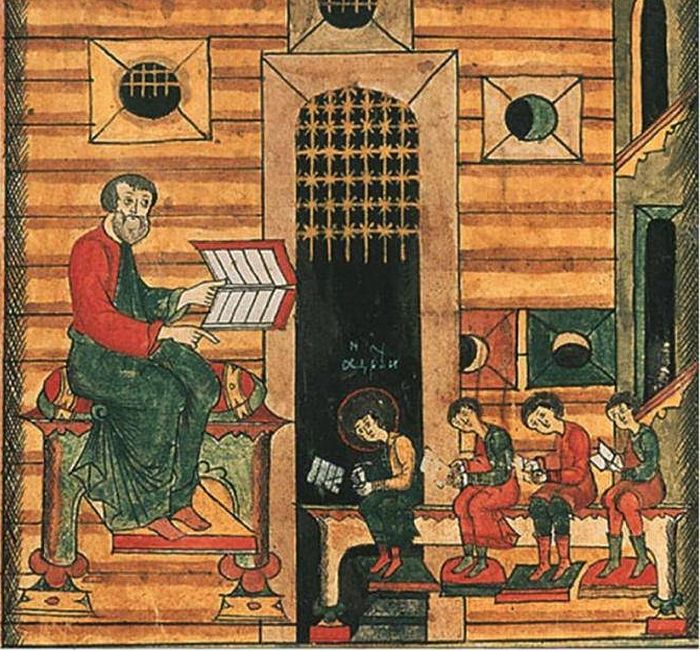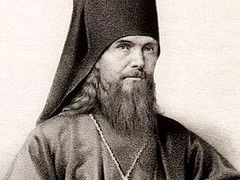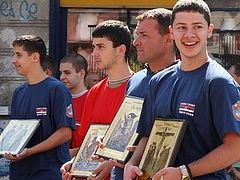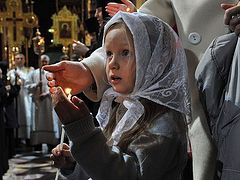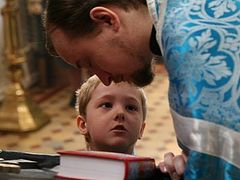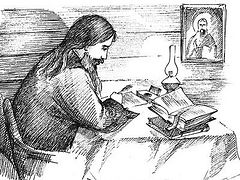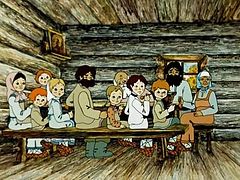Today we celebrate the translation of the relics of St. Theophan the Recluse from the Church of St. Sergius of Radonezh to Vysha Monastery in 2002.
In ancient Rus’, children were educated according to the examples of the lives of righteous ones and God-pleasers. First children learned to read the Psalter and the Horologion, and then they took up other books. “Among true Christians, wrote St. Theophan, “there is and always has been a need to have patristic writings about spiritual life at their fingertips…. Such publications of these writings in their complete volumes have always been used, such as saints Macarius [the Great], Isaac and Ephraim the Syrian, John Climacus, and many others…”
St. Theophan himself was raised in the pious family of a priest and from his earliest years loved God’s church. For example, his parents’ pious life remained forever in his memory and served as a moral compass throughout his whole life. He noticed from his own life experience that church life is the most powerful means for the proper upbringing of children. The Christian images with which the child comes into contact remain in his memory all his life, and serve as a firm foundation in all difficulties and trials: “A great influence on children is the frequent attendance of church, venerating the holy cross, Gospels, icons, being covered with the aires; also at home, the frequent leading to the icons, making the sign of the cross, sprinkling with holy water, censing, making the sign of the cross over his cradle, his food, and everything that comes into contact with him, the priest’s blessing, bringing icons into the home from the church, and molebens; in general—everything churchly in a wondrous manner warms and feeds a grace-filled life for the children and is always the safest and invincible wall against attempts by invisible dark powers.”
Having received a Christian foundation at an early age, the saint wrote about the importance of upbringing in the family. In developing the child’s mind, parents should provide accessible concepts of the fundamentals of life, goodness, evil; what is good and what is bad. It is the adults who can form these ideas in the child. St. Theophan the Recluse recommended that parents orient their children in such a way that they would fear doing their own will, so that without their parents’ permission they would not take any serious steps.
The saint was often asked, “How should a child be properly raised? How can we instill basic moral concepts in his soul?” He would give this advice: “Love your children, and they will love you.” But at the same, time this love must always be joined with reasonable strictness: “Dissolve strictness of authority with meekness, try to earn love with love; true goodness is also not foreign to a strict word.”
Precisely love for God and for people around us should lie at the foundation of upbringing. As in the life of any Christian who strives to walk the path of salvation, it is impossible without the daily inculcation and fruitful manifestation of these commandments, and so the educator who teaches the young Christian soul the virtues cannot fulfill his task without love. “It is the parent’s duty to instruct the children, and that would mean it is your duty also. And is there anything to fear? A loving word never irritates. A commanding word alone will never produce any fruit. So that the Lord would bless children to avoid dangers, one has to pray day and night. God is merciful! He has many means by which to prevent them—what does not come into our heads? God directs everything.”
There is a danger for teachers to neglect the Christian foundations of education, and according to the saint’s thoughts, such instructors “do not see the goal ahead of them, they do not see the path to it. Because of this, with all our fuss over modern education, they do nothing more than fan curiosity, self-will, and thirst for pleasure.” In order to avoid this, “it is necessary to transform elementary education according to new, true principles, and to introduce Christian elements into it, to correct the failings; most importantly, to keep at all times the education of the child under the abundant influence of the Holy Church, which works with all its dispensations upon the building of spirit.”
Parents await the period of their children’s growth with particular apprehension. This so-called “transitional age”, when yesterdays’ boy rapidly becomes a youth, when new friends and interests unexpectedly appear, he often becomes removed from his parents, more impertinent and disobedient. Many modern parents say that they don’t want their children to have religious convictions forced on them; they say, let them grow up and they will figure it out for themselves. However, St. Theophan wrote that this complicated growth period, which he compared to a “house without a fence” and “dry tinder in the fire”, goes much more smoothly if Christian moral foundations were already placed in the childhood years. The most reliable guidance in this age, in St. Theophan’s opinion, is the educator’s reasonable strictness and authority. “The river of our life is stanched by the willfulness of the period of youth. This is a time of simmering in the bodily-spiritual life. The toddler and child lives quietly, the man with venerable gray hair who inclines toward rest has few quick impulses; only youth boils with life. One has to have a very firm support in order to withstand the force of the waves in this period… What can we say about the one who not only did not love the Christian life and truth, but never even heard about it?.. He is a house without a fence, given over to theft, or dry tinder given over to be burned in the fire… The youth lives on his own; and who follows all the movements and inclinations of his heart? It is the same as following the path of a bird in the air or the running of a ship in the sea! The heart of the youth is like the bubbling of boiling liquid, or the action of diverse elements when mixed together. All the demands of so-called nature are in lively agitation, each gives its own voice and seeks satisfaction. As in our nature disturbance is seen, so also are these voices together like the unruly shouts of a noisy crowd. What will happen to the youth if he has not previously been taught to put his movements into a certain order and has not bound himself with the obligation to keep them in strict submission to certain higher demands? If these principles were deeply impressed in the heart in his early education and then consciously accepted as a rule, then all of these perturbations will occur as if on the surface, transiently, without moving the foundation, and not shaking the soul.”
Occupying various ecclesiastical-administrative positions, St. Theophan always related very attentively to questions of upbringing. He founded religious schools, church libraries, and actively encouraged the giving of sermons. To him belong the words about the high goal of upbringing and education: “Education is the most sacred of all sacred works… One must incline the spirit of the students so that the conviction would never be extinguished in them that our most important business is to please God, while scholarliness is a subordinate quality, incidental, useful only during the time of this life. Therefore it should never be placed so high and in such a glamorous light that it occupy all attention and devour all efforts. There is nothing more poisonous and destructive for the soul of a Christian life than this scholarliness and exclusive care for it. It throws one directly into coldness and then detains one in it forever…”
In the works of the recluse, ascetic and monk was worked out a whole pedagogical system of Orthodox education. In the opinion of the saint’s hagiographer S. A. Smirnov, “We find in Bishop Theophan’s works many instructions for the setting of elementary education, and in this respect he was an innovative pedagogue, way ahead of his time…. The essence of educational instruction boils down to the striving to give in school not only knowledge, not only to develop and enrich the mind, but also to cultivate all of the student’s psychological-emotional abilities, to morally educate and ennoble him. The saint’s whole educational system is rooted precisely in the idea of moral-cultivating teaching. It was his deep conviction that every healthy Russian school should definitely have religion and morality at its foundation.”
St. Theophan’s views on education are conveyed in several of his works, first of all in one of his most well known books, The Path to Salvation, which is in many people’s home libraries. This is the book through which people are often first acquainted with the Vysha recluse’s spiritual heritage. In this book is clearly formulated the order, rules and laws that are applied to the formation of personality from infancy. “Here is everything that has been written, is being written, and will be written by me,” said St. Theophan the Recluse of this book, emphasizing the centrality of its theme for all his literary and theological activities. In his Inscription of Christian Moral Teaching, the understanding of Christian morality is developed. The saint’s letters to his many spiritual children are also dedicated to the theme of education.

